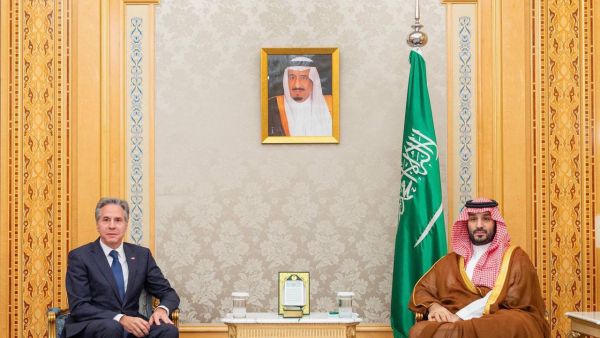ALBAWABA- U.S. Secretary of State Antony Blinken sought to advance Saudi-Israel normalization during a visit to Riyadh on Wednesday, aiming to leverage the potentially historic agreement to facilitate an end to the ongoing Gaza conflict.
Blinken's meeting with Saudi Crown Prince Mohammed bin Salman took place following his trip to Israel, where he met with Prime Minister Benjamin Netanyahu and emphasized the need to conclude the war.
He stated that Israel had achieved key strategic goals to prevent future incidents like the October 7th attack and called for hostilities to cease, the release of hostages, and a path for Palestinians to rebuild their lives.
Crown Prince Mohammed, who had withdrawn from attending the BRICS Summit in Russia, welcomed Blinken in Riyadh after the U.S. diplomat flew directly from Tel Aviv, bypassing commercial travel routes.
Blinken's regional tour came just weeks before the U.S. election, where President Joe Biden and Vice President Kamala Harris faced criticism for their handling of the Gaza conflict and U.S.-Israel relations.
Blinken's visit followed U.S. negotiations with Saudi Arabia to establish normalization with Israel, which included security guarantees from Washington.
In his discussions with Netanyahu, Blinken indicated that normalization would align Israel with Arab partners and isolate Iran. He met with Saudi Foreign Minister Prince Faisal bin Farhan and the Crown Prince to discuss ending the Gaza war and fostering regional stability through greater integration.
The possibility of Saudi Arabia officially recognizing Israel marks a significant shift, given the kingdom's role as the guardian of Islam's two holiest sites. Before the October 7 attack, Netanyahu had expressed optimism for strengthening ties with Riyadh.
However, with Saudi Arabia currently resisting normalization until there is progress toward Palestinian statehood, the U.S. sees normalization as a potential leverage point to secure a ceasefire.
Blinken highlighted the strategic opportunity to reshape regional dynamics despite the ongoing conflict. The U.S. administration believes that a deal between Israel and Saudi Arabia could parallel the normalization agreements reached with the UAE, Morocco, and Bahrain under the Trump administration in 2020.











